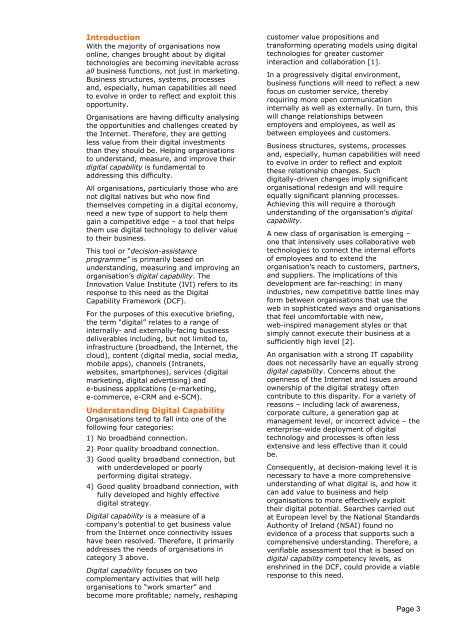Digital Capability - IVI Innovation Value Institute - National University ...
Digital Capability - IVI Innovation Value Institute - National University ...
Digital Capability - IVI Innovation Value Institute - National University ...
You also want an ePaper? Increase the reach of your titles
YUMPU automatically turns print PDFs into web optimized ePapers that Google loves.
Introduction<br />
With the majority of organisations now<br />
online, changes brought about by digital<br />
technologies are becoming inevitable across<br />
all business functions, not just in marketing.<br />
Business structures, systems, processes<br />
and, especially, human capabilities all need<br />
to evolve in order to reflect and exploit this<br />
opportunity.<br />
Organisations are having difficulty analysing<br />
the opportunities and challenges created by<br />
the Internet. Therefore, they are getting<br />
less value from their digital investments<br />
than they should be. Helping organisations<br />
to understand, measure, and improve their<br />
digital capability is fundamental to<br />
addressing this difficulty.<br />
All organisations, particularly those who are<br />
not digital natives but who now find<br />
themselves competing in a digital economy,<br />
need a new type of support to help them<br />
gain a competitive edge – a tool that helps<br />
them use digital technology to deliver value<br />
to their business.<br />
This tool or “decision-assistance<br />
programme” is primarily based on<br />
understanding, measuring and improving an<br />
organisation’s digital capability. The<br />
<strong>Innovation</strong> <strong>Value</strong> <strong>Institute</strong> (<strong>IVI</strong>) refers to its<br />
response to this need as the <strong>Digital</strong><br />
<strong>Capability</strong> Framework (DCF).<br />
For the purposes of this executive briefing,<br />
the term “digital” relates to a range of<br />
internally- and externally-facing business<br />
deliverables including, but not limited to,<br />
infrastructure (broadband, the Internet, the<br />
cloud), content (digital media, social media,<br />
mobile apps), channels (Intranets,<br />
websites, smartphones), services (digital<br />
marketing, digital advertising) and<br />
e-business applications (e-marketing,<br />
e-commerce, e-CRM and e-SCM).<br />
Understanding <strong>Digital</strong> <strong>Capability</strong><br />
Organisations tend to fall into one of the<br />
following four categories:<br />
1) No broadband connection.<br />
2) Poor quality broadband connection.<br />
3) Good quality broadband connection, but<br />
with underdeveloped or poorly<br />
performing digital strategy.<br />
4) Good quality broadband connection, with<br />
fully developed and highly effective<br />
digital strategy.<br />
<strong>Digital</strong> capability is a measure of a<br />
company’s potential to get business value<br />
from the Internet once connectivity issues<br />
have been resolved. Therefore, it primarily<br />
addresses the needs of organisations in<br />
category 3 above.<br />
<strong>Digital</strong> capability focuses on two<br />
complementary activities that will help<br />
organisations to “work smarter” and<br />
become more profitable; namely, reshaping<br />
customer value propositions and<br />
transforming operating models using digital<br />
technologies for greater customer<br />
interaction and collaboration [1].<br />
In a progressively digital environment,<br />
business functions will need to reflect a new<br />
focus on customer service, thereby<br />
requiring more open communication<br />
internally as well as externally. In turn, this<br />
will change relationships between<br />
employers and employees, as well as<br />
between employees and customers.<br />
Business structures, systems, processes<br />
and, especially, human capabilities will need<br />
to evolve in order to reflect and exploit<br />
these relationship changes. Such<br />
digitally-driven changes imply significant<br />
organisational redesign and will require<br />
equally significant planning processes.<br />
Achieving this will require a thorough<br />
understanding of the organisation’s digital<br />
capability.<br />
A new class of organisation is emerging –<br />
one that intensively uses collaborative web<br />
technologies to connect the internal efforts<br />
of employees and to extend the<br />
organisation’s reach to customers, partners,<br />
and suppliers. The implications of this<br />
development are far-reaching: in many<br />
industries, new competitive battle lines may<br />
form between organisations that use the<br />
web in sophisticated ways and organisations<br />
that feel uncomfortable with new,<br />
web-inspired management styles or that<br />
simply cannot execute their business at a<br />
sufficiently high level [2].<br />
An organisation with a strong IT capability<br />
does not necessarily have an equally strong<br />
digital capability. Concerns about the<br />
openness of the Internet and issues around<br />
ownership of the digital strategy often<br />
contribute to this disparity. For a variety of<br />
reasons – including lack of awareness,<br />
corporate culture, a generation gap at<br />
management level, or incorrect advice – the<br />
enterprise-wide deployment of digital<br />
technology and processes is often less<br />
extensive and less effective than it could<br />
be.<br />
Consequently, at decision-making level it is<br />
necessary to have a more comprehensive<br />
understanding of what digital is, and how it<br />
can add value to business and help<br />
organisations to more effectively exploit<br />
their digital potential. Searches carried out<br />
at European level by the <strong>National</strong> Standards<br />
Authority of Ireland (NSAI) found no<br />
evidence of a process that supports such a<br />
comprehensive understanding. Therefore, a<br />
verifiable assessment tool that is based on<br />
digital capability competency levels, as<br />
enshrined in the DCF, could provide a viable<br />
response to this need.<br />
Page 3












